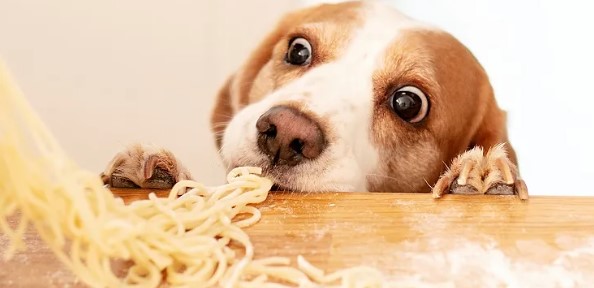Yes, Dogs can eat pasta as part of a balanced diet, but it should be in moderation.
Pasta is not toxic to dogs but should be given in moderation as part of a balanced diet. While pasta can provide dogs with some carbohydrates, it should be different from their primary source of nutrition, which should primarily come from high-quality dog food.
Plain, cooked pasta is the best option for dogs, as it avoids any potential health risks associated with added ingredients like salt, sauces, or seasonings. As with any human food given to dogs, it is essential to consult a veterinarian to ensure it is safe and suitable for your canine companion.
Table of Contents
Understanding Pet Nutrition
Initially, it would help if you understood the basics of a balanced canine diet, especially regarding nutrition. One common question among dog owners is whether dogs can eat pasta.
Dogs can indeed eat pasta, but it should be used in moderation. Pasta is a carbohydrate, and while carbohydrates are an essential part of a dog’s diet, it is vital to balance their intake.

Carbohydrates provide energy for dogs, but they should not make up most of their diet. Dogs are primarily carnivorous animals, so their primary source of nutrition should come from high-quality protein sources like meat.
When feeding pasta to your dog, it is best to use whole-grain options rather than refined pasta. Whole-grain pasta contains more fiber and nutrients, making it healthier for your furry friend. Also, be mindful of the portion size and avoid adding sauces or seasonings that may harm dogs.
Pasta For Dogs: Safe Or Not?
Pasta is made from a combination of durum wheat semolina, water, and sometimes eggs. Durum wheat semolina contains gluten, a protein that provides structure and elasticity to the pasta dough.
Gluten intolerance is common in dogs, so it is essential to be cautious when feeding them pasta. Eggs, if included, can provide additional protein and nutrients, but they can also be a potential allergen for some dogs.
Different types of pasta have varying nutritional profiles. Whole-grain pasta retains more nutrients and fiber compared to refined varieties. Whole wheat pasta is healthier for dogs as it contains more vitamins, minerals, and fiber. Enriched pasta is fortified with nutrients like iron and B vitamins, making it a better choice than regular refined pasta.
Serving Pasta to Dogs
Introducing pasta into a dog’s diet can be delicious and nutritious. However, follow a few steps to ensure a smooth transition:
- Firstly, check with your veterinarian to ensure that pasta is safe for your dog’s dietary needs.
- Secondly, add small amounts of cooked and unseasoned pasta to their regular meals. Observe their response and any signs of digestive upset.
- Gradually increase the pasta portion size but keep it less than 10% of their food intake. Remember to cook the pasta thoroughly and avoid using any seasonings, sauces, or additives that may be harmful.
- When it comes to portion sizes, consider the breed of your dog. Larger species may require slightly larger portions compared to more miniature or toy breeds.
Monitoring your dog’s weight and overall health is crucial, as every dog is unique with different dietary needs.
| Breed Size | Ideal Pasta Portion Size |
| Small or Toy | 1-2 tablespoons |
| Medium | 1/4 to 1/2 cup |
| Large | 1/2 to 1 cup |
| Giant | 1 to 2 cups |
However, these are general guidelines you should adjust based on your dog’s needs.
Potential Health Benefits
Pasta is a good carbohydrate source, which contributes to dogs’ energy production. It also contains fiber, which aids in digestive health and can help prevent constipation.
Pasta is rich in vitamin B, which is crucial to a dog’s metabolism and cognitive function. It also provides iron and zinc, essential minerals that support a healthy immune system and contribute to overall well-being.
Choose whole wheat or gluten-free pasta options to minimize the risk of allergies and ensure easy digestibility for your pup. Remember to cook pasta without any seasoning and serve it in moderation as part of a balanced diet for your canine companion.
Risks Involved
Dogs can eat pasta in moderation, but there are risks involved. One of the main concerns is the potential for allergies. Some dogs may have allergies to certain ingredients commonly found in pasta, such as wheat or eggs.
Also, watch for any signs of an allergic reaction, such as itching, hives, or gastrointestinal issues. If your dog shows any symptoms, it’s best to avoid feeding them pasta.

Another risk is the danger of overfeeding pasta to dogs. Pasta is a high-carbohydrate food that can contribute to weight gain if given in large quantities.
However, ensure your dog’s overall diet is balanced and includes a variety of nutrients. Also, pasta often contains sauces or seasonings, such as garlic or onions, that may harm dogs.
Safest Types Of Pasta For Dogs
Plain pasta, such as whole wheat or brown rice, is generally safe for dogs. These varieties are less likely to contain harmful additives or seasonings that can upset their stomachs or cause allergic reactions.
Flavored varieties of pasta, on the other hand, should be avoided. They often contain ingredients like garlic, onions, or spices that can be toxic to dogs. Additionally, heavily seasoned or cheesy pasta dishes can be too rich for their digestive system, leading to an upset stomach or diarrhea.
If you’re looking for pasta alternatives for your healthy pet, consider cooked vegetables like sweet potatoes, carrots, or green beans. These can be a nutritious and flavorful addition to their diet. Just make sure to introduce new foods gradually to avoid any digestive upset.
What About Gluten-free Pasta?
Exploring gluten intolerance in dogs, consider gluten-free pasta varieties as an option. While traditional pasta contains gluten, which can be harmful to dogs with gluten intolerance, alternatives are available that are safe for them to consume.
Rice pasta, made from rice flour instead of wheat, is famous. It is gentle on the digestive system and easy to digest. Quinoa pasta is another gluten-free option with essential amino acids and a low glycemic index.
Buckwheat pasta is another suitable choice, despite its name, as it is a seed related to rhubarb. It has a nutty flavor and is rich in fiber, protein, and essential minerals. Corn pasta is a gluten-free alternative with a slightly different taste and texture.
Observing Your Dog Post-pasta Consumption
After feeding your dog pasta, monitor for any adverse reactions. Dogs can enjoy pasta as an occasional treat, but some may experience digestive issues or allergies.
Look for signs of discomfort or distress, such as vomiting, diarrhea, excessive drooling, or bloating. These symptoms may indicate that your dog is having difficulty digesting the pasta.
If your dog experiences severe or persistent symptoms, it’s crucial to consult a veterinarian. They can help determine if your dog is having an allergic reaction or if an underlying issue needs to be addressed.
FAQs on Can Dogs Eat Pasta
Can Dogs Eat Pasta?
Dogs can eat pasta in moderation as long as it’s plain, cooked, and contains no harmful ingredients like garlic or onion.
Is Pasta Good For Dogs?
While plain pasta is not harmful, it doesn’t provide essential nutrients. Therefore, it’s best to consider pasta an occasional treat for your furry friend.
What Are The Risks Of Feeding Pasta To Dogs?
Feeding dogs too much pasta can lead to weight gain and digestive issues. Additionally, certain pasta sauces or ingredients can be toxic.
How Should Pasta Be Prepared For Dogs?
Pasta for dogs should be plain, cooked, and unseasoned. Avoid adding sauces, spices, or seasonings that may harm your pet’s health.
Final Words
Feeding your dog pasta in moderation and with appropriate considerations can be safe. Ensure the pasta is cooked plain and doesn’t contain any harmful ingredients like garlic or onions. While dogs can digest pasta, it should always supplement their regular, balanced diet.
Always consult with your veterinarian before making any changes to your pet’s diet. Remember, a healthy and nutritious diet is crucial for your furry friend’s long-term well-being.





